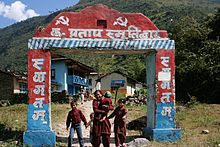Communist Party of Nepal (Maoist Centre): Difference between revisions
No edit summary |
|||
| Line 28: | Line 28: | ||
The post-[[Mao]] [[People's Republic of China]] also opposes the group as a destabilizing force in the region. The Maoist rebels, like Maoists internationally, accuse the PRC of restoring capitalism in the formerly socialist nation. China aided the monarchy until the spring 2006 popular uprising. |
The post-[[Mao]] [[People's Republic of China]] also opposes the group as a destabilizing force in the region. The Maoist rebels, like Maoists internationally, accuse the PRC of restoring capitalism in the formerly socialist nation. China aided the monarchy until the spring 2006 popular uprising. |
||
[[India]] had provided the Nepali government with aid to combat the insurgency and is currently holding two commanders of the CPN-M in jail. The government of India has also engaged in negotiations with CPN-M leadership. The CPN-M is politically allied with the Communist Party of India (Maoist), an organization waging a revolutionary war against the Indian government and social structure. |
[[India]] had provided the Nepali government with aid to combat the insurgency and is currently holding two commanders of the CPN-M in jail. The government of India has also engaged in negotiations with CPN-M leadership. The CPN-M is politically allied with the [[Communist Party of India (Maoist)]], an organization waging a revolutionary war against the Indian government and social structure. |
||
In [[2004]], a small group split from the CPN(M) to form [[Janatantric Terai Mukti Morcha]]. |
In [[2004]], a small group split from the CPN(M) to form [[Janatantric Terai Mukti Morcha]]. |
||
Revision as of 03:34, 12 December 2006
| Part of a series on |
| Communism in Nepal |
|---|
 |
|
|
The neutrality of this article is disputed. |
The Communist Party of Nepal (Maoist) or CPN(M) is a Maoist political party founded in 1994 and led by Pushpa Kamal Dahal, otherwise known as Prachanda.
Overview
The CPN (M) was formed following a split in the Communist Party of Nepal (Unity Centre) and it used the name 'CPN (Unity Centre)' until 1995. On February 13, 1996 it launched the "Nepalese People's War", and it now controls 3/4 of the country's territory. Its works have been crucial in creating a nation-wide political awareness and consensus.

The party follows the Maoist guerrilla strategy of "people's war" in which they attempt to take gradual control of the countryside to encircle the cities, only fighting with government forces on their own terms when they can significantly outnumber their enemy.
In 2001, the Nepalese Army began a military campaign against the Maoists, especially in the western areas of the country, although there have been intermittent ceasefires.
The CPN (M) is a member of the Revolutionary Internationalist Movement and the Coordination Committee of Maoist Parties and Organizations of South Asia.
The Trade union wing of the party is the All Nepal Trade Union Federation (Revolutionary).
The student wing of the party is the All Nepal National Free Students Union (Revolutionary).
In 2006 the CPN (M) signed a 12 point agreement with the Seven Party Alliance in order to further the Loktantra Andolan. Following this, a three month ceasefire was declared yet the process of 'forced donations' is alleged to be continuing. [1]
Criticism
The U.S. Department of State has placed the Communist Party of Nepal (Maoist) on its list of Specially Designated Nationals (SDN list), and has sent $20 million in aid to the government of Nepal. Former U.S. Secretary of State Colin Powell met with the Nepalese government in 2002, the first U.S. cabinet-level delegation to visit the Himalayan nation.
In August 2005, the European Union condemned CPN(M) for using children as soldiers in the civil war of Nepal. It claimed that about 400 child soldiers had died in the country's civil war. The CPN-M responds that while it cares for orphans among those killed in the war, this is different in kind from having child soldiers.
The post-Mao People's Republic of China also opposes the group as a destabilizing force in the region. The Maoist rebels, like Maoists internationally, accuse the PRC of restoring capitalism in the formerly socialist nation. China aided the monarchy until the spring 2006 popular uprising.
India had provided the Nepali government with aid to combat the insurgency and is currently holding two commanders of the CPN-M in jail. The government of India has also engaged in negotiations with CPN-M leadership. The CPN-M is politically allied with the Communist Party of India (Maoist), an organization waging a revolutionary war against the Indian government and social structure.
In 2004, a small group split from the CPN(M) to form Janatantric Terai Mukti Morcha.
Party slogans
- "Workers of the world unite!"
- "Long live the Communist Party of Nepal (Maoist)"
- "Long live Marxism-Leninism-Maoism and Prachanda Path"
See also
- History of Nepal
- Politics of Nepal
- Geography of Nepal
- Nepal Civil War
- List of political parties in Nepal
- Coordination Committee of Maoist Parties and Organizations of South Asia (CCOMPOSA)
- Communism
External links
- Communist Party of Nepal (Maoist) official website
- L'Espresso-Interview with Prachanda: Our revolution won, November 2006
- L'Espresso-Interview with Prachanda as Video, November 2006
- Interview with Comrade Prachanda, General Secretary of the Communist Party of Nepal (Maoist)
- BBC news Video/Transcript Interview with Prachanda
- interview with Baburam Bhattarai, No.2 in CPN(M) Washington Times December 14 2002
- Li Onesto, a sympathetic journalist who has spent a great deal of time covering the Maoists
- An audio presentation by Li Onesto on the people's war
- Left Hook on Nepal's Civil War
- Nepal Maoists, live news feed
- A critical view of the Maoists from Global Security
- National Geographic Slideshow "Inside Nepals Revolution"
- International Road-Building Brigades to Nepal official website
